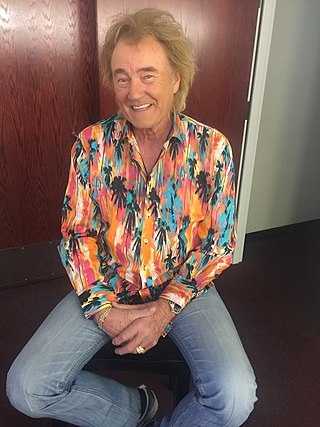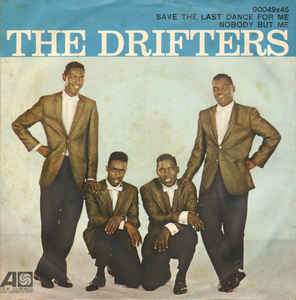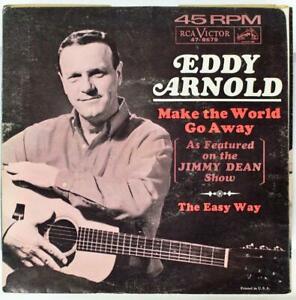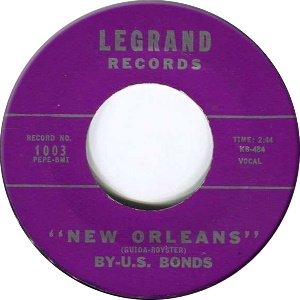Related Research Articles

Edward Garvin Futch, known professionally as Eddy Raven, is an American country music singer and songwriter. Active since 1962, Raven has recorded for several record labels, including ABC, Dimension, Elektra, RCA, Universal, and Capitol Records. After multiple albums which yielded few hit songs, his greatest commercial success came between 1984 and 1990, during which time Raven achieved six number-one singles on the Billboard Hot Country Songs charts. These were "I Got Mexico", "Shine, Shine, Shine", "I'm Gonna Get You", "Joe Knows How to Live", "In a Letter to You", and "Bayou Boys". Raven has a total of eighteen top-ten hits on that chart. Although his chart success diminished in the 1990s, Raven continued to record throughout the 1990s and into the 21st century. In addition to his own work, he has written singles for Don Gibson, Randy Cornor, Jeannie C. Riley, Connie Smith, and The Oak Ridge Boys among others. Raven's music is defined by mainstream country, country pop, Cajun music, and reggae, and he wrote a large number of his singles by himself or with Frank J. Myers.
"I Really Don't Want to Know" is a popular song written by Don Robertson (music) Howard Barnes (lyrics). The song was published in 1953.

"You Don't Know Me" is a song written by Eddy Arnold and Cindy Walker in 1955. "You Don't Know Me" was first recorded by Arnold that year and released as a single on April 21, 1956, on RCA Victor. The best-selling version of the song is by Ray Charles, who took it to number 2 on the Billboard Hot 100 chart in 1962, after releasing the song on his number 1 album Modern Sounds in Country and Western Music. The first version of the song to make the Billboard charts was by Jerry Vale in 1956, peaking at number 14 on the pop chart. Arnold's version charted two months later, released as an RCA Victor single, 47–6502, backed with "The Rockin' Mockin' Bird", which reached number 10 on the Billboard country chart. Cash Box magazine, which combined all best-selling versions at one position, included a version by Carmen McRae that never appeared in the Billboard Top 100 Sides listing.

"Misty Blue" is a song written by Bob Montgomery that has been recorded and made commercially successful by several music artists. Although Montgomery wrote the song for a different artist in mind, it was brought first to the attention of Wilma Burgess in 1966. It was recorded by Eddy Arnold the following year, both versions were top 5 Country Hits. A decade later, blues artist Dorothy Moore released the highest-charting version of the song and it reached the top ten in several different radio formats. Following Moore's revival of the track, numerous artists re-covered the tune, including country artist Billie Jo Spears. Spears's version would also go on to become a successful single release. Numerous other artists and musicians of different genres have recorded their own versions of "Misty Blue". The song is now considered both a country music and blues standard.

"Save the Last Dance for Me" is a song written by Doc Pomus and Mort Shuman, first recorded in 1960 by American musical group the Drifters with Ben E. King on lead vocals. It has since been covered by several artists, including Dalida, the DeFranco Family, Emmylou Harris, Dolly Parton, and Michael Bublé.

"Make the World Go Away'" is a country pop song composed by Hank Cochran. It has become a Top 40 popular success three times: for Timi Yuro (1963), Eddy Arnold (1965), and the brother-sister duo Donny and Marie Osmond (1975). The original version of the song was recorded by Ray Price in 1963. It has remained a country-crooner standard ever since.
"Gonna Find Me a Bluebird" is a song written and performed by Marvin Rainwater. It reached number three on the U.S. country chart and number 18 on the U.S. pop chart in 1957. The song was featured on his 1957 album, Songs by Marvin Rainwater.

"Then You Can Tell Me Goodbye" is a song written by John D. Loudermilk. It was first released in 1962 by Don Cherry, as a country song and again as a doo-wop in 1967 by the group The Casinos on its album of the same name, and was a number 6 pop hit that year. The song has since been covered by Eddy Arnold, whose version was a number 1 country hit in 1968, and by Neal McCoy, whose version became a Top 5 country hit in 1996.
"Bouquet of Roses" is a 1948 song written by Steve Nelson (music) and Bob Hilliard (lyrics). It was originally recorded by Eddy Arnold and his Tennessee Plow Boys and his Guitar in Chicago on May 18, 1947. It was released by RCA Victor as catalogue number 20-2806 and by EMI on the His Master's Voice label as catalogue numbers BD 1234 and IM 1399. "Bouquet of Roses" was Eddy Arnold's third number one in a row on the Juke Box Folk Record chart and spent 19 weeks on the Best Selling Folk Records chart. In 1949, when RCA Victor introduced its new 45 RPM single format this record was among seven initial releases and the first in the Country and Western category. Arnold would re-record "Bouquet of Roses" several times during his career.
"I Walk Alone" is a song written by Herbert Wilson. and recorded by American country music artist, Eddy Arnold and was the B-side of his 78 rpm single "Did You See My Daddy Over There" (1945), and later for his compilation album Eddy Arnold Sings Them Again (1960).
"The Tip of My Fingers", also titled "The Tips of My Fingers", is a song written and originally recorded by American country music singer Bill Anderson. First included on his 1962 album Bill Anderson Sings Country Heart Songs, the song was a Top Ten country single for him in 1960.
"Loving You" is a song written by Jerry Leiber and Mike Stoller and performed by Elvis Presley with backup vocals provided by The Jordanaires. It reached No. 15 on the U.S. country chart, #20 on the U.S. pop chart, and #24 on the UK Singles Chart in 1957. It was featured on his 1957 album Loving You. It was featured in Presley's 1957 movie Loving You. The single's A-side, "(Let Me Be Your) Teddy Bear" reached No. 1 on the U.S. pop, country, and R&B charts and #3 on the UK Singles Chart in 1957.
"What Am I Living For" is a song written by Fred Jay and Art Harris and performed by Chuck Willis featuring the Reggie Obrecht Orchestra and Chorus. It reached No. 1 on the U.S. R&B chart and #9 on the U.S. pop chart in 1958.
"Send for Me" is a song written by Ollie Jones and performed by Nat King Cole featuring the McCoy's Boys. It reached No. 1 on the U.S. R&B chart and No. 6 on the U.S. pop chart in 1957. The song was arranged by Billy May.
"With These Hands" is a song written by Benny Davis and Abner Silver and performed by Eddie Fisher featuring Hugo Winterhalter and His Orchestra. It reached number 7 on the U.S. pop chart in 1953.
"Burning Bridges" is a song written by Walter Scott, and best known for its 1960 recording by Jack Scott, which was a #3 hit in the US. This was the only hit song for composer Walter Scott, who was no relation to Jack Scott.

"New Orleans" is a song written by Frank Guida and Joseph Royster and performed by Gary U.S. Bonds. It was featured on his 1961 album Dance 'Til Quarter to Three with U.S. Bonds. Frank Guida also produced the track. Backing was provided by Gene Barge's group The Church Street Five.
"Rainin' in My Heart" is a song written by James Moore and Jerry West and performed by Harpo. It reached number 17 on the U.S. R&B chart and number 34 on the U.S. pop chart in 1961. It was featured on his 1961 album Slim Harpo Sings "Raining in My Heart..." It is not to be confused with the similarly titled Buddy Holly song, "Raining in My Heart".
"I Love You More and More Every Day" is a song written by Don Robertson and performed by Al Martino. It was featured on his 1964 album I Love You More and More Every Day/Tears and Roses. The single was arranged by Peter DeAngelis and produced by Voyle Gilmore.

"The World Is a Ghetto" is a song written and performed by War. The song was produced by Jerry Goldstein, and was featured on their 1972 album The World Is a Ghetto.
References
- ↑ "Jack Scott, What in the World's Come Over You". Discogs . Retrieved February 28, 2019.
- ↑ "CHUM Hit Parade - February 29, 1960".
- ↑ "Jack Scott, "What in the World's Come Over You" Chart Positions" . Retrieved February 28, 2019.
- ↑ "Billboard Top 100 - 1960". Archived from the original on January 2, 2014. Retrieved February 28, 2019.
- ↑ "Sonny James, "What in the World's Come Over You" Chart Position" . Retrieved February 28, 2019.
- ↑ "Tom Jones, "What in the World's Come Over You" Chart Positions" . Retrieved February 28, 2019.
- ↑ "Les Baxter, Young Pops". Discogs . Retrieved February 28, 2019.
- ↑ "Johnny Lee, "So Nice to Be with You" Single Release" . Retrieved February 28, 2019.
- ↑ "Tam White, "What in the World's Come Over You" Single Release". Discogs . 1975. Retrieved February 28, 2019.
- ↑ "Eddy Arnold, Best of Eddy Arnold". AllMusic . Retrieved February 28, 2019.
- ↑ "Wanda Jackson, Let's Have a Party". Discogs . 1992. Retrieved February 28, 2019.
- ↑ "Jim Reeves, Country Chart Classics". AllMusic . Retrieved February 28, 2019.